 This week, Strange Horizons published my review of Ivo Stourton’s new novel The Happier Dead. The book is framed as a murder mystery set in a near future where rejuvenation treatment is available to those who can afford it, and riot is fomenting among those who can’t. To go alongside the mystery, Stourton is also interested in exploring the ramifications of the rejuvenation treatment (and the mindset that created it) for his future society. In the end, this doesn’t quite all come together, but The Happier Dead does have its moments.
This week, Strange Horizons published my review of Ivo Stourton’s new novel The Happier Dead. The book is framed as a murder mystery set in a near future where rejuvenation treatment is available to those who can afford it, and riot is fomenting among those who can’t. To go alongside the mystery, Stourton is also interested in exploring the ramifications of the rejuvenation treatment (and the mindset that created it) for his future society. In the end, this doesn’t quite all come together, but The Happier Dead does have its moments.
Tag: science fiction
Reading round-up: late July
Notes on some of my recent reading…
 Jessie Burton, The Miniaturist (2014)
Jessie Burton, The Miniaturist (2014)
Amsterdam, 1686: Nella Oortman is aged eighteen and about to begin her new life as wife of the successful merchant Johannes Brandt – but she is met at the house by Brandt’s stand-offish sister, Marin; the merchant himself is nowhere to be seen. There are secrets to be uncovered in the Brandt household, and someone seems to know about them than ought to be possible – the mysterious miniaturist who sends Nella models for the replica house that was Brandt’s wedding gift. The Miniaturist is a pacey historical mystery; but it’s also about what it means to challenge social roles – Nella, Brandt and Marin all step outside the norms that society prescribes for them, and Jessie Burton explores the ramifications of this in an intriguing debut.
Andrew Crumey, Mr Mee (2000) and Mobius Dick (2004)
Andrew Crumey has been on my list of authors to try for quite some time, having head very good things about his work. Now I have tried him – thanks to Dedalus Books and their new editions of two Crumey novels – and my only regret is that I didn’t do it earlier.
I can’t think of a better way to sum up Crumey’s work in a few words than ‘comedy of ideas’, which is how its blurb describes Mr Mee. Crumey presents us with three narrative threads. In the first, Mr Mee – an elderly amateur researcher – writes to an unknown correspondent detailing his attempts to find out more about Jean-Bernard Rosier, an 18th century French thinker who appeared to have some fairly advanced ideas on physics. The second thread takes us to Paris of 1761 and Ferrand and Minard, copyists in possession of Rosier’s writings, who flee the city and end up living next to Jean-Jacques Rousseau. The third strand concerns Petrie, a university lecturer on Rousseau who wants to get closer to one of his students. There’s a good deal of humour in this novel – particularly in Mr Mee’s delightful unworldliness, as he tries to navigate the byways of the internet – but also intrigue from seeing how the different plot threads will tie together. And, though Rosier’s rarefied ideas may be at the root, I find it’s the simpler, more personal revelations that really hit home in Mr Mee.
Both of these books remind me of Christopher Priest’s work, particularly in the sense that reality within them is mutable, but this is mediated through textual accounts, with the added layers of uncertainty that they bring. Mobius Dick put me specifically in mind of Priest’s The Affirmation, as both create multiple realities that vie for validity. Crumey switches between the stories of John Ringer, a university lecturer in quantum physics; and Harry Dick, a man who wakes up in hospital having lost his memory. Alongside these are extracts from novels by one Heinrich Behring, often featuring Erwin Schrödinger. There are contradictions between the different narrative tracks, and once again, the intrigue comes from seeing exactly how these will be resolved. Science and art are intertwined in Mobius Dick, with the sense that both are different ways of addressing the idea of ‘reality’. I like that approach, and I’ll be reading more of Crumey in the future.
Hamid Ismailov, The Dead Lake (2011)
Translated from the Russian by Andrew Bromfield, 2014
This short novel by Usbek writer Hamid Ismailov is the first title in Peirene Press’s ‘coming-of-age’ series. It’s the tale of Yerzhan, a promising young violinist from the Kazakh steppes who has a crush on his neighbour’s daughter, Aisulu. Yerzhan’s life is changed irrevocably when, trying to impress, Aisulu, he dives into a lake which has been poisoned by nuclear testing – and his growth is arrested from thereon.
There’s a fairytale quality to The Dead Lake, as events take an absurd, exaggerated turn; for example, while Yerzhan’s body remains that of a child, Aisulu grows immensely tall. This quality is reflected in the tone of Andrew Bromfield’s translation, which also evokes the vast openness of the landscape in which Ismailov’s story takes place – an openness that contrasts with the way Yerzhan has become trapped. The Dead Lake as a whole is a work of contrast, one that might appear whimsical at times, but never lets you forget the seriousness lying underneath.
Linda Mannheim, Above Sugar Hill (2014)
This collection is from Influx Press, a publisher of ‘site-specific’ fiction. The stories in Above Sugar Hill are all set in Washington Heights, the area of New York City where Linda Mannheim grew up. It’s not a place I know myself, but Mannheim’s characters, and the worlds they inhabit, come vividly off the page. A couple of examples: ‘Once’ tells of a troubled girl’s on-off friendship with a woman who had a difficult past of her own; the background is one of idealism and protest fading away, just as some of the local buildings are decaying. In ‘Tenor’, through a series of interviews, we hear of Ira Gittman, a housing activist who disappeared in tragic circumstances; it is implied that Gittman’s story could be the story of many others – and the whole collection implies that there are many more stories like these out there, waiting to be told.
Science fiction playing catch-up
I’ve been shadowing a lot of award lists lately: I’ve read through the longlists for this year’s Independent Foreign Fiction Prize (for fiction in translation) and Desmond Elliott Prize (debut novels), as well as the shortlist for the Arthur C. Clarke Award (science fiction). Add in last year’s Man Booker (the ever-nebulous ‘literary’ fiction) and Edge Hill Prize (short story collections), and you have all my main reading interests. So I think all that reading has given me a reasonable cross-section of current UK publishing in the areas I care most about; and something bothers me – there are books on all of those lists that I like very much, and books on all of them that I don’t think deserved to be there; but, taking each one as a whole, the Clarke shortlist comes right at the bottom for me in terms of quality.
Science fiction and fantasy are where I started as a reader, and I still believe that the fantastic as a whole has a vital contribution to make to literature. So it gave me no pleasure to see the Clarke lagging behind those other awards; but it bore out a trend that I see elsewhere in my reading (most of which falls under one of the five awards’ headings) – on average, contemporary sf published in the UK is punching well below its weight. I’m reminded of a comment made by the science fiction author Tony Ballantyne in an interview that I came across when I was reviewing his novel Dream London:
I…think that the most exciting and cutting edge work in writing is being produced [in sf and fantasy]. If you look at mainstream literature, it’s about twenty years behind what we’re doing now.
I’m not convinced that this could even be true hypothetically, simply because the cutting edge is more likely to be found in pockets among various kinds of fiction, rather than in a single one. But behind Ballantyne’s remark is a firm belief that sf is leading the pack. I think that, ten or fifteen years ago, it was certainly keeping pace: writers like China Miéville and Jeff VanderMeer were emerging at the same time as (say) Sarah Waters and Michel Faber. These days, however, it seems to me that sf is struggling to keep up.
It’s not that sf is lacking books at the top end of the scale; the likes of James Smythe can hold their own. It’s that, generally, it has fewer of them than the literary ‘mainstream’, and that the average seems to be lower down the scale. If I take writing quality (the backbone of any piece of fiction) as an example, even when I look at my least favourite titles from some of the award lists – such as D.W. Wilson’s Ballistics or Emma Donoghue’s Astray – they’re at worst OK; but, from the Clarke shortlist, there’s stuff in Ramez Naam’s Nexus and Phillip Mann’s The Disestablishment of Paradise that makes me cringe.
One area for which I’d expect sf (with its imagining different ways of being) to be a natural fit is engaging with textual form. Sometimes it still is, in the work of writers like Christopher Priest, but they seem few and far between these days. When I reviewed Dave Hutchinson’s Europe in Autumn earlier this year, I noted that there was a separation between its chapters that mirrored the novel’s fragmented setting, and that this stood out as an unusual engagement with form. The thing is that, in and of itself, it isn’t a particularly radical approach to novelistic form; but it still stood out to me as being relatively rare in genre science fiction. However, if I turn to the mainstream, and a novel like Nathan Filer’s Costa-winning The Shock of the Fall, I see a patchwork of different forms and styles integrated into a standard narrative, and it feels quite commonplace. In other words, I think there’s a level of experimentation with form in the mainstream that now seems unremarkable, which would seem remarkable in genre sf. Imagine what Nexus would be like if it were actually written as though its characters’ minds were linked; instead, it’s a pretty routine thriller – and this is something I see all too often in sf.
Predicting the future is not the business of sf, but it can engage with the future and explore the kinds of issues and choices that may face us. Even here, though, contemporary sf is hit and miss: James Smythe’s The Machine is (by some distance) the title on this year’s Clarke list that explores its issues the most searchingly, but it’s also the one published as mainstream. Niall Harrison has criticised The Disestablishment of Paradise for a lack of nuance in its treatment of ecological issues. When I watched ‘Be Right Back’ in the last series of Charlie Brooker’s Black Mirror, I was struck that a drama by a mainstream satirist was telling a robot story that examined issues of identity in a way that contemporary genre sf seemed largely to be shying away from. These are areas where sf truly can do better than the mainstream, and I only wish it would take up the challenge more often.
I’m excited to see authors like Eleanor Catton (who, to my mind, is squarely at the cutting edge of English-language fiction) and Eimear McBride emerging in the mainstream – and especially to see them winning and being shortlisted for multiple awards. But, when I look at genre sf published in the UK, I simply can’t see that they have equivalents emerging. I wish I could. All in all, though, my reading is showing me that sf has a lot of catching up to do.
Reading round-up: mid May
Time for another look at some of the books I’ve been reading recently…
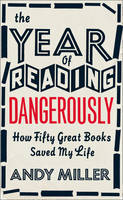 Andy Miller, The Year of Reading Dangerously (2014)
Andy Miller, The Year of Reading Dangerously (2014)
With all the business of work and family, Andy Miller had read only one book for pleasure (The Da Vinci Code) in three years; then he found a second-hand copy of The Master and Margarita, and started reading:
…borne aloft on Bulgakov’s impassioned words, I felt the dizzying force of books again, lifting me off the 6.44, out of myself, away from Mrs Atrixo [a fellow-commuter of Miller’s who would manicure herself on the train] and her hands. How had I lived without this? (pp. 30-1)
Spurred on by that feeling, Miller made a list of fifty books he’d always meant to read (and that he’d told people he had read, when he hadn’t), and challenged himself to read them; The Year of Reading Dangerously is his account of that time. Some of the books he likes, some he doesn’t; but Miller is always entertaining when he writes about them, and there’s always a keen sense of how personal this reading is to him.
Reading this book reminded me of Eleanor Catton’s idea of literature as encounter, because that’s very much what Miller is describing here (indeed, he and Catton make some of the same points). This volume isn’t a list of ‘fifty books you must read’; it’s the story of one person rediscovering what he loves about books, and finding a place for them in his life. It’s an inspiring piece of work.
The Year of Reading Dangerously is published in the UK by Fourth Estate, and will be published in the US by Harper Perennial on 9 December.
Oscar Coop-Phane, Zenith Hotel (2012)
Translated from the French by Ros Schwartz (2014)
Now this is an example of how important social media can be for translated books and small publishers: Zenith Hotel (published by Arcadia Books) comes covered in quotes from bloggers, bookshops and other people on Twitter (it even bears the #translationthurs hashtag created by Stu from Winstonsdad’s Blog). And if all that praise wasn’t enough to raise a sense of expectation, there’s also the fact that Oscar Coop-Phane was only 24 when he won the French Prix de Flore for this, his first novel.
What we have in Zenith Hotel is a short (not even 100 pages) portrait of a day in the life of a prostitute named Nanou, and her clients. With great economy, Coop-Phane depicts a succession of men, each with their own individual situations and concerns; but makes clear that, when they go to their appointment at the Zenith Hotel, each man is no more (or less) significant than the rest. Tying the book together is the world-weary voice of Nanou, who refuses to tell us much about herself: the most important thing is what’s happening now, and what she needs to do to keep going. Ros Schwartz’s translation creates fine distinctions between these characters whom we glimpse briefly but clearly, underlining the subtlety of Coop-Phane’s work.
Dave Eggers, A Hologram for the King (2012)
This was a choice for my reading group, one I was looking forward to as my first experience of reading Dave Eggers. I don’t know quite what I was expecting – probably the kind borderline fabulism that (rightly or wrongly) I tend to associate with McSweeney’s – but it wasn’t what I got. A Hologram for the King is the story of Alan Clay, a middle-aged consultant who has travelled to Saudi Arabia in the hope of making the business deal that will turn his work and life around – if only the King would turn up so Alan can make his presentation.
I gather that this book is written in a plainer style than is usual for Eggers (the literary equivalent of an acoustic set, perhaps); I think the sparseness does have its moments, but not as many as I’d hope for. I appreciate the parallel Eggers creates between the difficulties of Alan’s personal life and the USA’s economic situation, but… A Hologram for the King just never really came to life for me. Still, I would like to try reading Eggers again one day; hopefully this title was just a blip.
A Hologram for the King is published in the UK by Penguin.
Lois Lowry, The Giver (1993)
My reading group also recently started a science fiction offshoot, for which this was the first choice. I hadn’t come across book or author previously, though it’s a YA title that I would have been roughly the right age for at the time of publication, and it’s the sort of book I would have read. I think the teenage me would have liked The Giver very much; but the adult me still enjoyed it.
Lois Lowry starts by briskly outlining some of the contours of her fictional world. This is an enclosed community where everything is highly structured, even growing up: every year, there’s a ceremony at which children are given the appurtenances of the next phase of their lives; until they reach Twelve, when age no longer matters and they begin the ‘assignment’ which will occupy them for the rest of their lives. Relations between children and adults in the same family unit may seem oddly distant, and there are clear hints that some catastrophe happened in the past; but this society appears to work well enough. Our protagonist is Jonas, who at Twelve is sent to The Giver, an old man who will pass on the community’s memories – suffice to say, there’s a reason most people don’t remember them.
I liked The Giver for its crispness of telling, and its thoughtfulness on issues of individuality and conformity. There’s also a wonderful shift of perception halfway through which I was nowhere near predicting. I think the book is let down slightly by its ending, which is a little too abrupt – not so bad in the context of the four-book series which The Giver begins, but it leaves this volume feeling unbalanced on its own terms. My teenage self would have wanted to read on.
The Giver is published in the UK by HarperCollins Children’s Books.
Anna Jaquiery, The Lying-Down Room (2014)
This is the first in a new series of crime novels set in Paris, written by French-born and Australia-resident Anna Jaquiery. Commandant Serge Morel investigates the grisly murder of an elderly woman, a case which will lead him into the past of Soviet Russia – all while his father is slowly succumbing to dementia, and there’s turbulence in his personal life. Jaquiery balances the different elements of her novel well, and the historical thread adds an interesting dimension. All in all, the Morel series is off to a good start with The Lying-Down Room.
The Lying-Down Room is published in the UK by Mantle.
Clarke Award 2014: in review
This year, the Arthur C. Clarke Award received a record 121 submissions, which set the stage for an exciting shortlist and debate. However, my initial feeling about the actual shortlist was that it felt a bit… well, unadventurous; it wasn’t going to stretch anyone’s idea of science fiction (something which the Clarke often does, and which I value it for), didn’t seem to have benefitted from the uniquely broad view of the field that the Clarke enjoys. Of course there’s no reason in principle that a shortlist focused on core genre can’t be a good shortlist; now I’ve read the books, however, I can’t help feeling that the titles on the periphery of the shortlist should be at its centre, and the titles at the centre of the shortlist shouldn’t be there at all.
 I’ve been going back and forth, trying to decide which one of two shortlisted books I’d jettison first; in the end, there’s so little to choose between them that I may as well call it a tie for last place. Listing the two in alphabetical order means I start with The Disestablishment of Paradise by Phillip Mann. This is the story of a scientist taking a final sojourn on the planet of Paradise as its human colony is dismantled, and uncovering the secrets of its strange ecology. Mann’s novel feels curiously old-fashioned to me, and is scuppered by its terrible treatment of gender (‘What fools we women are sometimes!’ thinks the protagonist at one point; there are many more examples). This goes right down into the heart of the text, and overshadows what interest there may be in its ecological themes.
I’ve been going back and forth, trying to decide which one of two shortlisted books I’d jettison first; in the end, there’s so little to choose between them that I may as well call it a tie for last place. Listing the two in alphabetical order means I start with The Disestablishment of Paradise by Phillip Mann. This is the story of a scientist taking a final sojourn on the planet of Paradise as its human colony is dismantled, and uncovering the secrets of its strange ecology. Mann’s novel feels curiously old-fashioned to me, and is scuppered by its terrible treatment of gender (‘What fools we women are sometimes!’ thinks the protagonist at one point; there are many more examples). This goes right down into the heart of the text, and overshadows what interest there may be in its ecological themes.
Also bringing up the rear of the shortlist for me is Ramez Naam‘s Nexus, named for an experimental drug which links human minds. Like Mann’s book, Nexus gives its female characters a poor deal, mostly sidelining them or otherwise using them as adjuncts to its male protagonist. The novel also has its weaknesses structurally: though there are moments when Nexus reflects on the implications of its titular drugs, these are largely drowned out by a humdrum thriller plot that doesn’t do the book’s ideas justice.
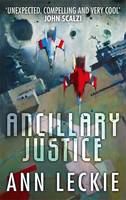 Ann Leckie‘s Ancillary Justice – a thundering space opera with an AI-protagonist whose consciousness once spanned a gestalt of spacecraft and human auxilliaries, and is now confined to a single human body – has been a very popular book. I’ve seen effusive praise for it, and also some more lukewarm reactions; I’m in the latter camp. Leckie sets out some interesting territory to explore, such as issues of colonialism and gender (the protagonist defaults to using the pronoun ‘she’ for all characters, which gives the novel a distinctive texture); but, again, it feels to me as though the adventure plot is holding everything back.
Ann Leckie‘s Ancillary Justice – a thundering space opera with an AI-protagonist whose consciousness once spanned a gestalt of spacecraft and human auxilliaries, and is now confined to a single human body – has been a very popular book. I’ve seen effusive praise for it, and also some more lukewarm reactions; I’m in the latter camp. Leckie sets out some interesting territory to explore, such as issues of colonialism and gender (the protagonist defaults to using the pronoun ‘she’ for all characters, which gives the novel a distinctive texture); but, again, it feels to me as though the adventure plot is holding everything back.
Now to the second – and, to my mind, more successful – half of the shortlist. The Adjacent is pretty much a distillation of Christopher Priest’s individual creative vision, so what you think of it will largely depend on whether you like Priest’s work in general. I do, and I like The Adjacent: yes, there are issues with the book (particularly around its treatment of gender and the depiction of a British Islamic republic); but it also contains what I found to be the single most affecting sequence in the entire Clarke shortlist (at heart, The Adjacent is a love story), and its portrayal of bleeding realities is bracing stuff for the imagination. I don’t think that The Adjacent quite reaches the heights of Priest’s previous Clarke-winning The Separation, but it’s a considerable work all the same. I just think there are two other novels on the shortlist which are even more fully realised than this.
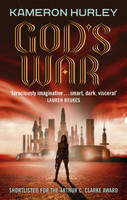 Action-adventure sf tends to be the poor relation when it comes to the Clarke, so it’s nice to find an example on the shortlist that feels as though it can hold its own. God’s War by Kameron Hurley comes tearing off the page with its protagonist, a no-nonsense female bounty-hunter, and its vividly depicted background of a centuries-long war on a planet with insectile technology. Issues of faith, gender, and the body combine in a novel whose adventure aspects complement its ideas, giving them room to breathe and flourish.
Action-adventure sf tends to be the poor relation when it comes to the Clarke, so it’s nice to find an example on the shortlist that feels as though it can hold its own. God’s War by Kameron Hurley comes tearing off the page with its protagonist, a no-nonsense female bounty-hunter, and its vividly depicted background of a centuries-long war on a planet with insectile technology. Issues of faith, gender, and the body combine in a novel whose adventure aspects complement its ideas, giving them room to breathe and flourish.
In some ways, James Smythe‘s The Machine is a very different book from God’s War, its almost claustrophobic calmness and intimate canvas worlds away from Hurley’s widescreen action. But I do think the two novels share an intensity of focus and a facility for dramatising their concerns. If I prefer The Machine over God’s War, it is really only because my personal taste runs more towards the quieter sort of novel than to action-adventure; I couldn’t place one novel ahead of the other in terms of how well each embodies and achieves its own project. That’s why I would be most happy to see either Smythe or Hurley take the Clarke when it is announced next Thursday.
James Smythe, The Machine (2013)
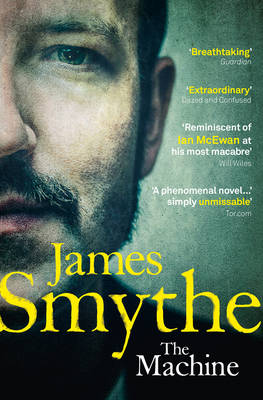 Last year, I watched ‘Be Right Back’, an episode of Charlie Brooker’s Black Mirror in which a woman has her dead husband’s personality downloaded into a robot body. It was the kind of intimate, human drama that genre science fiction doesn’t seem to do very much these days (on page or screen); too often, I find, interesting ideas will be drowned out by an ill-suited conspiracy/thriller plot.
Last year, I watched ‘Be Right Back’, an episode of Charlie Brooker’s Black Mirror in which a woman has her dead husband’s personality downloaded into a robot body. It was the kind of intimate, human drama that genre science fiction doesn’t seem to do very much these days (on page or screen); too often, I find, interesting ideas will be drowned out by an ill-suited conspiracy/thriller plot.
It was so refreshing, then, to read James Smythe’s The Machine, and find a work of contemporary science fiction that’s happy to be understated (tellingly, the novel is published as mainstream). We begin with Beth McAdams taking receipt of three large packages. The delivery men don’t know what they are (‘exercise equipment,’ Beth tells them, though she knows they won’t believe her); the neighbours gawp as these parcels have to be brought in through Beth’s window because they won’t fit through the door. When the whole contraption is assembled, it fills most of one wall and emits a constant whirring noise; even before Beth begins using it, the Machine has staked a claim on her world.
The Machine was originally invented as a means of treating the effects of harmful memories (such as those of conflict experienced by soldiers like Beth’s partner Vic), but it left those who used it severely brain-damaged, and the original device was banned. Later, it emerged that the Machine might also be able to reinstate the memories it took; Beth has sourced an outlawed model, and plans to use it on Vic.
So there are questions of identity to be explored – who will Vic be if his memories are restored? for example – but what particularly intrigues me about The Machine is how much it focuses on Beth. The first third of the novel consists largely of Beth’s preparations for the summer holidays, when she will be able to put her teaching job aside and concentrate on tending Vic. The second part of The Machine then begins with Beth bringing Vic home from the hospice; his unresponsive body is difficult to get through the door, and she wonders if the neighbours are watching. This is a marvellous touch, because it draws parallels between Vic and the Machine, underlining the similar position that each has come to occupy in Beth’s life. Smythe then depicts the routine that Beth has to establish, looking after Vic in his current state, and playing back his memories through the Machine. The detail is unflinching, emphasising that this is what Beth must do to achieve the end she wants – perhaps the regime that Beth’s caught up in is the real Machine.
Smythe’s evocation of place in The Machine is economical and effective. Beth lives on the Isle of Wight, the crossing to the mainland now made more treacherous by the effects of a warming climate (so Beth is partly dislocated by geography, which mirrors her emotional state). The heat frays tempers has brought about all sorts of little pragmatic social changes; we see these particularly through the tense relations between adults and young people in the novel – and, again, the technique underscores Beth’s feelings, this time her desperation.
I’m tempted to quote from The Machine, because its prose hits the mark so well. But the real effect of Smythe’s writing comes not from its individual pieces, but from the accumulation of the whole – its relentless, plain-speaking precision. Smythe portrays a situation which is as intense for the reader to experience as it would be for Beth, because we move through it in the same way, and at the same pace, as she does. The line ultimately blurs between whether Beth is doing what she does for Vic or for herself ; and maybe it doesn’t matter – maybe it all comes back to the actions, the mechanics.
Elsewhere
James Smythe’s website
Some other reviews of The Machine: Nina Allan; Savidge Reads; Words of Mercury; For Winter Nights.
Reviews elsewhere: Dave Hutchinson and Jeremy P. Bushnell
Today I’m rounding up a couple of recent reviews that I’ve had published on other sites. First, I am back at Strange Horizons with a look at Dave Hutchinson‘s new novel, Europe in Autumn (published by Solaris). This is a tale of espionage set in a future Europe which has fractured into myriad small polities – but there’s a quietness to the whole book that I find very interesting. Europe in Autumn has an engagement with form and tone that I’d love to see more often in contemporary genre science fiction. You can read my full review of the novel here.
***
I also have a new review up at We Love This Book, of Jeremy P. Bushnell‘s debut novel, The Weirdness (published by Melville House). Here it is:
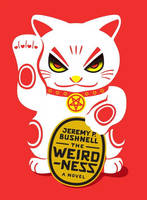 Jeremy Bushnell’s first novel is the tale of a man finding his way in a world that turns out to be stranger than he ever imagined.
Jeremy Bushnell’s first novel is the tale of a man finding his way in a world that turns out to be stranger than he ever imagined.
Billy Ridgeway is a thirty-year-old aspiring writer who wonders at the weirdness of everyday life: isn’t it just odd that you can walk into a bodega in New York and buy bananas? And why exactly did people start keeping animals as pets? One day, the Devil visits Billy’s apartment and offers him a deal: stop a warlock who’s trying to unlock the secrets of a magical artefact that could destroy the world, and Lucifer will ensure that Billy’s book is published (short stories are such a hard sell, after all). Billy doesn’t quite agree at first, but the Devil has ways of persuading him; and so begins Billy’s journey of adventure and discovery.
Perhaps the greatest strength of The Weirdness is its sheer exuberance (or cheek), as Bushnell gleefully piles absurdity on top of outlandishness. Barely any part of Billy’s life remains ordinary, so it’s not so much a case of suspending your disbelief as just abandoning it and going with the flow. Yet there’s a certain distancing effect at play, as though all the magic is just a sideshow; at the heart of The Weirdness is the story of Billy finding out what really matters in life – and what matters is much more down to earth. For all that Bushnell’s novel is a fantastical romp, it doesn’t lose sight of the human dimension.
(The original review is here.)
Reading round-up: early February
Roelof Bakker & Jane Wildgoose, Strong Room (2014)
A new project from Roelof Bakker, the artist-photographer behind the 2012 anthology Still, presented as a stapled booklet fastened with a crocodile clip. Like the earlier anthology, Strong Room contains a selection of Bakker’s photographs of the vacated Hornsey Town Hall; but, where Still was perhaps more about space, this collection is focused on detail, and how physical objects can be both permanent and transient.
The images in Strong Room are close-ups of objects in the Town Hall: the torn upholstery of chairs in the council chamber; boxes of nuts and bolts in the maintenance room; document files in the strong room. It seems to me that Bakker is highlighting that the context in which these objects mattered has gone, and what’s left is their abstract detail.
Alongside Bakker’s photographs is a short piece in which writer Jane Wildgoose describes an instance of requesting an old document from a medical library. It seems a fairly unremarkable act, but Wildgoose uses it to reflect on themes of past and present, virtual and physical: using the electronic technology of her laptop to call for a hefty leather-bound tome which is handled with great care. Wildgoose’s text approaches the same issues as Bakker’s photographs from a different angle; all adds up to a thought-provoking whole.
 Arthur Koestler, Darkness at Noon (1940)
Arthur Koestler, Darkness at Noon (1940)
Translated from the Hungarian by Daphne Hardy
This was my book group’s most recent selection, and it generally went down well. I was undecided after reading Darkness at Noon as to whether it was a book for me, and I’m still not sure after our discussion. This book is the tale of Rubashov, once a high-ranking official in his country’s governing Party, now imprisoned and interrogated as a traitor to the regime. Koestler’s depiction of a show trial is grimly effective, with reference to people being executed for holding the ‘wrong’ opinions on seemingly trivial subjects, and Rubashov being inexorably worn down. I still suspect that Koestler’s prose is a bit too clinical for me to experience its full force; but, then again, that detachment is part of the point. I’m glad I read Darkness at Noon, though; and I wouldn’t have read it if not for the book group.
Eliza Granville, Gretel and the Dark (2014)
In Vienna of 1899, eminent psychoanalyst Josef Breuer is intrigued by his latest case, a girl he calls Lilie, who claims to be a machine. Some years later, young Krysta is living in a strange new place, where she befriends a boy named Daniel, whom her uncle insists is not a real child. Gradually, the two stories intertwine, as Josef tries to find out more about Lilie, and Krysta’s world grows darker. Along the way, Granville reflects on different ways in which people may put stories to use: to justify terrible prejudices, but also as a source of hope and (literal) escape. And the closing revelation is of the sort that makes me feel like reading the novel again, to see what else there is to find.
Antti Tuomainen, The Healer (2010)
Translated from the Finnish by Lola Rogers (2013)
In a Helsinki beset by the effects of climate change, poet Tapani Lehtinen searches for his missing wife, Johanna. He learns that Johanna, a journalist, was researching ‘The Healer’, a serial killer targeting those he deems responsible for climate change, with the aim of ‘cleaning up’ society’s ills. Tapani starts to wonder whether Johanna’s work took her too close to The Healer. There’s an interesting sparseness to the atmosphere of Tuomainen’s novel, but overall The Healer doesn’t quite work for me. The near-future setting doesn’t seem to add much (there is a subtext comparing the encroachment of climate change to Tapani’s personal situation, but I don’t find it to be carried through), and the resolution of the mystery plot is corny.
Koren Zalickas, Mother, Mother (2013)
Things are not going well for the Hurst siblings. The eldest, Rose, disappeared in her last year of school. Violet attacked her brother, Will, and has been sent to a psychiatric institution. Will, who has autism and epilepsy, is looked after and home-schooled by his mother, Josephine, who obviously knows best for him – doesn’t she? But now Violet is receiving letters from Rose, who appears to be happily settled in a new life; and child protection officers are calling on Josephine… The ghastly truth of what’s really happening in the Hurst household is only gradually – and effectively – revealed in an interesting debut novel from Koren Zalickas.
Alternate worlds, Stephen King, and Vector
Issue 274 of the BSFA’s critical journal Vector arrived in the post just before Christmas. It was a very special moment for me, because this issue contains my first published piece of criticism about books: a look at how two contrasting collections of linked stories (one, Nina Allan’s The Silver Wind, speculative fiction; the other, David Vann’s Legend of a Suicide, not) treat what might be termed ‘alternate worlds’. I was pleased with how the piece turned out, and hope to be able to republish it online at some point.
For now, however, I will leave you with the review that I also have in this issue of Vector, of Stephen King’s time-travel novel, 11.22.63:
Stephen King, 11.22.63 (2011)
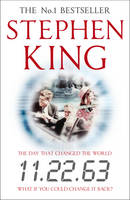 There’s a portal leading to 1958 in the storeroom of Al Templeton’s diner. No matter how much time someone spends there, only two minutes will have elapsed in the present when they return. Their actions in the past may altered the present – but all will be reset if the portal is used again. Al has tried to change the course of history by preventing the assassination of John F. Kennedy; but cancer caught up with him before he could wait out the necessary five years. Back in 2011, he enlists teacher Jake Epping to go back and do what he couldn’t.
There’s a portal leading to 1958 in the storeroom of Al Templeton’s diner. No matter how much time someone spends there, only two minutes will have elapsed in the present when they return. Their actions in the past may altered the present – but all will be reset if the portal is used again. Al has tried to change the course of history by preventing the assassination of John F. Kennedy; but cancer caught up with him before he could wait out the necessary five years. Back in 2011, he enlists teacher Jake Epping to go back and do what he couldn’t.
JFK’s murder may be the impetus of its plot, but the main focus of 11.22.63 for much of its length is Jake’s experience of the past: his realisation that he quite likes it back there, and his personal relationships, especially in Jodie, the small Texas town where he eventually settles and falls in love with a librarian named Sadie Dunhill. This strand has its moments, but in many ways it’s the least interesting aspect of King’s novel: as a character, Jake is rather anonymous – which is part of what helps him slot into 1958, but it also means there’s less emotional interest when he’s not being driven by his mission.
Nor is there much friction between past and present in the novel. Jake sees signs of the period’s prejudice and bigotry, but never has cause to truly confront or engage with them. For King’s protagonist, the 1950s and ‘60s can, unproblematically, be a time when root beer tasted better and folks were friendlier. The odd acknowledgement of social attitudes that don’t sit well with Jake’s liberal sensibilities does not carry much force in the face of this living past’s seductive nostalgia.
There are intriguing hints throughout 11.22.63’s midsection that time itself its resisting Jake’s attempts to change history; this maintains tension over whether he will actually succeed. But it’s not until novel’s end that the time travel aspect comes right to the fore – and here the book unbalances, as the tone built up over 700 pages shifts more than once over the next 30. A historical domestic drama with overtones of a thriller becomes a compressed science fiction story, and the transition is too abrupt to work.
The characterisation of Jake also causes the ending to come unstuck. Up to that point, the protagonist has seemed mostly detached; now, he acts with a strength of feeling that we haven’t really seen before – that King hasn’t really earned on the page. What’s more, the closing shifts feel like an author trying to have his cake and eat it, backtracking on a commitment to an emotional position. It’s a frustrating end to an uneven novel.
Reading round-up: late October
Here are some notes on what I’ve been reading lately…
 Bernardine Evaristo, Mr Loverman (2013)
Bernardine Evaristo, Mr Loverman (2013)
Hearing Bernardine Evaristo read from this novel was one of my highlights from this year’s Penguin General Bloggers’ Evening, so naturally I was interested to read Mr Loverman. Our narrator is the charming Barrington Walker: 74 years of age, not quite as happily married to Carmel as he once was, and sixty years into a secret relationship with his old friend Maurice. Now is the time for Barry decide what he really wants in life; his story on its own would be fine, but Evaristo broadens out her portrait to show other characters’ analogous difficulties. The occasional chapters told from Carmel’s viewpoint (in a prose-poetry style that’s a little less immediate than Barry’s narration, and so distances us slightly from her, just as she is from him) show how her delight at marrying Barry back in 1960s Antigua has paled in the decades since. The Walkers’ daughters are also finding that their lives may not necessarily have turned out as they or their parents imagined, adding another layer to a satisfying read.
Ian Sales, The Eye With Which the Universe Beholds Itself (2013)
Ian Sales continues his Apollo Quartet of novellas set in futures where the history of space exploration went differently; as with Adrift on the Sea of Rains, the second volume proves an interesting character study. We join Bradley Elliott at two points in his career: in 1979, when he was about to become the first (and only) human to set foot on Mars; and twenty years later, as he goes on a mission to a far more distant world. What’s so striking about this novella is the air of resignation and melancholy that Sales creates: Elliott may be the only person capable of undertaking his 1999 mission, but there is also the strong sense that this is the only thing that Elliott can do with his life.
Maryam Sachs, The Passenger (2013)
Translated by Gael Schmidt-Cléach
In this intriguing short novel, a German woman arrives in Paris for her son’s birthday. She’s taken the journey from Charles de Gaulle many times; but this one becomes very different when the woman strikes up a conversation with her taxi driver, a Romanian who once lived in Japan. The pair’s conversation ranges far and wide, taking in their personal histories, their thoughts on art and moving between cultures. But this journey is not just a geographic one, as the woman starts to realise she is something of a passenger in her own life, and that it may now be time for her to take the wheel.

Tom Cheshire, The Explorer Gene (2013)
Technology journalist Tom Cheshire tells the story of Auguste, Jacques and Bertrand Piccard: three generations of the same family who became respectively the first person to enter the stratosphere; the person who travelled deeper into the ocean than anyone else ever has; and the first to circle the globe non-stop in a balloon. The Piccards’ story is extraordinary, and Cheshire brings it vividly to life, from the opening scene of Auguste struggling to deal with the leaking cabin of his experimental balloon, right through to Bertrand’s current plans for a solar-powered aircraft.
Jorn Lier Horst, Closed for Winter (2011)
Translated from the Norwegian by Anne Bruce, 2013
A dead body is found in the summer cottage of a television presenter, sparking a new investigation for Chief Inspector William Wisting. Retreating from her relationship, Wisting’s daughter Line, an investigative journalist, settles into the family cottage to write a novel – and finds another body on the nearby beach. These two threads spiral together into a tense narrative, with an added undercurrent examining social change and the forces that may drive people to commit crime.
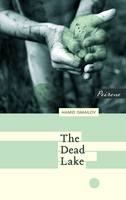
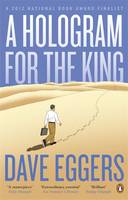

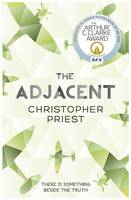
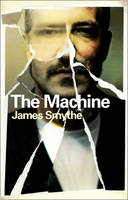
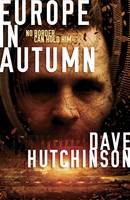

Recent Comments